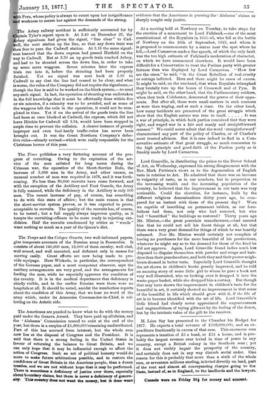At a meeting held at Newbury on Tuesday, to take'
steps for the erection of a monument to Lord Falkland, —one of the most constitutional of the Royalists in 1641-43, who fell at the battle of Newbury on the 20th of September, 1643, and whom it is proposed to commemorate by a statue near the spot where he fell,—Lord Carnarvon made a fine speech, of which the only fault was the too high estimate of Falkland's moderation of character, on which we have commented elsewhere. It would have been difficult for a Conservative to treat the Puritan party with greater fairness than was displayed by Lord Carnarvon. "How few are the cases," he said, " in the Great Rebellion of real cruelty or outrage inflicted. Here and there might be cases of excess. It might be said, on the one hand, that when Royalists triumphed they brutally tore up the bones of Cromwell and of Pym. It might be said, on the other hand, that the Parliamentary soldiers, when they took Colchester, desecrated the graves of their oppo- nents. But after all, these were small matters in such contests as were then waging, and at such a time. On the other hand, how many incidents are preserved of the great straggle which show that the English nature was true to itself It was a war of principle, in which both parties conceived that they were right, and waged war in a fair and manly and straightforward manner." We could never admit that the word 'straightforward' characterised any part of the policy of Charles, or of Charles's most trusted advisers. But it is rare indeed to find in a Con- servative estimate of that great struggle, so much concession to the high principle and good-faith of the Puritan party as is frankly made by Lord Carnarvon.






































 Previous page
Previous page